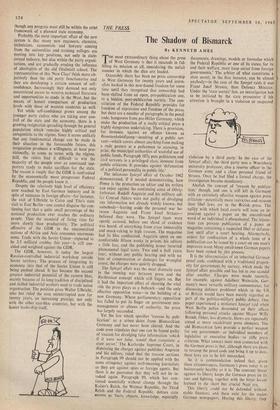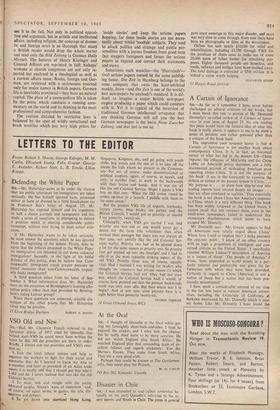THE PRESS
The Shadow of Bismarck
By KENNETH AMES
TliE most extraordinary thing about the press of West Germany is that it succeeds in ful- filling its mission at all, considering the unfair manner in which the dice are loaded.
Ostensibly there has been no press censorship in West Germany for twenty years and journ- alists basked in this new-found freedom for some time until they recognised that censorship had been shifted froin an open, pre-publication one, to a hidden, post-publication variety. The con- stitution of the Federal Republic provides for freedom of expression and fivedom of the press, but there are a number of paragraphs in the penal code, hangovers from pre-Hitler' Germany, which make the production of a really critical press a highly dangerous undertaking. There is provision, for instance, against an offence known as Beamtenbeleidigung—insulting of a public ser- vant—which covers almost anything from making a rude gesture at a policeman to accusing, in print, the municipal authorities of wasteful use of public funds. Paragraph 187a puts politicians and civil servants in a privileged class, immune from public criticism. It provides against 'defamation of a political personality in public life.'
The infamous Spiegel affair of October 1962 demonstrated, if it needed demonstrating, how flimsy is the protection an editor and his writers can enjoy against the continuing sense of ()brig- keitsstaat. Rudolf Augstein and his military edi- for Conrad Ahlers were not guilty of divulging any information not already widely known, but somebody—leaving aside the personal war be- tween Augstein and Franz Josef. Strauss— believed they were. The Spiegel team were openly accused, before one shred of evidence was heard, of everything from crass immorality and muck-raking to high treason. The magazine had its files confiscated, Augstein spent an un- comfortable fifteen weeks in prison, his editors a little less, and the publishing house incurred phenomenal legal costs. Two and a half years later, without any public hearing and with no -hint of compensation or damages for wrongful arrest, the charges were quietly dropped.
The Spiegel affair was the most dramatic case in the running war between press and the Rechtsstaat concept' which still lingers on. But it had the important effect of showing the vital role the press plays as a bulwark--and the only effective opposition voice—in the building of a new Germany. Where parliamentary opposition has failed to put its finger on government mis- management or abuses of authority, the press has largely succeeded.
Yet the law which specifies `treason by pub- lication' as a crime dates from Bismarckian Germany and has never been altered. And-the
code even stipulates that one can be found guilty of treason for divulging false information 'which if it were not false, would then constitute a state secret.' The Karlsruhe Supreme Court, in dismissing the charges against publisher Augstein
and his editors, ruled that the treason sections in Paragraph 99 should not be applied with the same stringency against well-meaning journalists as they are against spies or foreign agents. But there is no guarantee that they will not be in- voked again. Paragraph 99, which has con- tinued essentially without change through the Kaiser's Reich, the Weimar Republic, the Third Reich and the Federal Republic, defines state secrets as `facts, objects, knowledge, especially
documents, drawings, models or formulae which the Federal Reptiblic or one qf its states, for its and their welfare, must keep secret from foreign governments.' The arbiter of what constitutes a state secret, in the first instance, can be almost anybody—in the case of the Spiegel raids it was , Franz Josef Strauss, then Defence Minister. Under the 'state secrets' law, an investigation has to be initiated by the state prosecutor if his attention is brought to a violation or suspected violation by a third party. In the case of the Spiegel affair, the third party was a Wuerzburg
university professor, also a reserve officer in the German army and a close personal friend of Strauss. Once he had filed a formal charge, the investigation became mandatory.
Abolish the concept of 'treason by publica- tion,' though, and one is still left in Germany with an extremely effective weapon against press criticism—potentially more restrictive and ruinous than libel laws are to the British press. The agility with which local courts will issue an in- junction against a paper on the unconfirmed word of an individual is phenothenal. The injunc- tions can prevent publication of a paper or magazine containing a suspected libel or defama- tion until after a court hearing. Alternatively, orders for confiscation of a whole issue of a publication can be issued by a court on one man's unproven word. Many small-town German papers have been ruined by this process.
It is the idiosyncrasies of an inherited German penal code, combined with a traditional propen- sity for government by secrecy, which made the
Spiegel affair possible and has led to one scandal after another. Charges were made recently,
for example, against Adalbert Weinstein, Ger- many's most versatile military commentator, for discussing defence problems' which in the US or Britain would have been merely regarded as
part of the politico-military public debate. One paper experienced a miniature Spiegel raid when
West Berlin police descended on their offices following personal attacks against Mayor Willy Brandt. Other, less dramatic, blows are repeatedly aimed at more recalcitrant press elements. The old Bismarckian laws provide a perfect weapon for any government—or individual members of legislative or executive bodies—to stifle press criticism. What annoys most men connected with the German press is that, although there are plans to revamp the penal code and bring it up to date, these laws arc to be left untouched.
So it is commendation indeed that, given these circumstances, Germany's press today is as boisterously healthy as it is. The constant threat against its liberty keeps the German press dri its toes and fighting, together with the bitter lesson learned in the short but crucial Nazi era.
This liberty could not be defended without stable finances; and these exist for the major German newspapers. Having this liberty, they
use it to the full. Not only in political opposi- tion and argument, but in artistic and intellectual affairs, including religion, the coverage of domes- tic and foreign news is so thorough that many a British reader would drop the whole matter and read only the Bild Zeit:tug (a German Daily Mirror). The lectures of Henry Kissinger and General Ailleret are reprinted in *full; bishops' sermons at church congresses are not only re- ported but analysed in a theological as well as a current affairs sense. Books, foreign and Ger- man, are reviewed with a seriousness reserved only for major names in British papers. German life is inevitably provincial—they have no natural capital. The place of a cosmopolitan life is taken by the press, which conducts a running com- mentary on the world and its thinking in the most professional and comprehensive fashion.
The caution dictated by restrictive laws is balanced by the spur of wildly sensational and brash weeklies which pay very high prices for 'inside stories' and keep the serious papers hopping, for these inside stories are not neces- sarily ,about trivial 'modish' subjects. They tend to attack politics and strategy and public per- sonalities with a joyous freedom from good taste that staggers foreigners and forces the serious papers to expand and correct their statements and views.
Sometimes such weeklies—the 'illustrateds'— rival serious papers owned by the same publish- ing house. Die Zeit in Hamburg belongs to the same company that owns the least-inhibited weekly, Stern—and Die Zeit is one of the world's best newspapers by anybody's standard. It is dif- ficult to imagine a major British newspaper empire producing a paper which could compare with 'it. Yet it is typical of the inversion of traditional German intellectual arrogance that any thinking German will tell you the best German newspaper is the Swiss Neue Zuercher Zeitung, and that just is not so. s



































 Previous page
Previous page